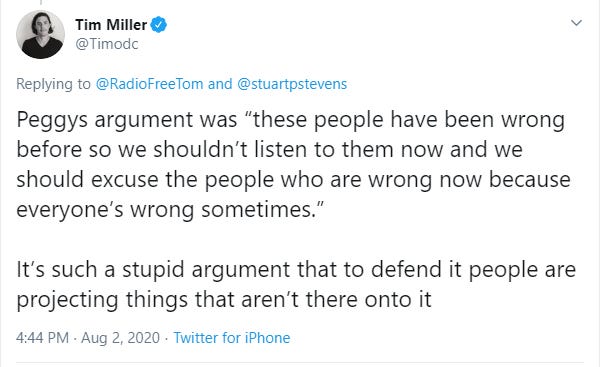The Unbearable Lightness of Peggy Noonan
She thinks Never Trumpers are “bloody-minded” and nihilistic for wanting to see Trump’s enablers voted out.
Happy Monday. It occurs to me that perhaps we should start the week with some thoughts about nihilism.
Over the weekend, Peggy Noonan wafted into the fray about whether or not we should hold Republican elected officials accountable for their collaboration with Trumpism. In the shorthand of our political discourse this has become known as "Burn It All Down," which was actually the title of something I wrote here just a week ago.
But the arsonist imagery has gotten strained. So, by all means call the Metaphor Police on me.
The argument here is that the dysfunction of the GOP runs much deeper than just Trump himself; and that it is necessary to hold enablers accountable at the ballot box. But critics have seized on the "burning" analogy to suggest that this is not simply a prudent act of political hygiene but rather an expression of blind, and even nihilistic rage. David French has suggested that it smacks of "vengeance."
Noonan also thinks it is tacky. She concedes that Trump himself is awful, but more in Noonanesque sorrow than anger she counsels, well, doing pretty much nothing about the GOP elected officials who have collaborated with him.
She writes:
Now various of his foes, in or formerly of his party, want to burn the whole thing down—level the party, salt the earth where it stood, remove Republican senators, replace them with Democrats.
This strikes me as another form of nihilism. It’s bloody-minded and not fully responsible. . . So there we have "nihilism" again, the dark impulse that brought us Trumpism in the first place. But as our colleague Mona Charen noted last week, it's an exceedingly strange take.
Voting against a candidate or even a whole party is not nihilism. It’s not “burning it all down.” It’s the legal, constitutional way to express approval or disapproval. The current Republican party has itself chosen to become the arsonist party. It has decided to go along with undermining faith in institutions, shredding norms, elevating conspiracy theories, disregarding laws, and tossing aside truth whenever the leader dictates.
Noonan could perhaps have addressed that point, but as you may have noticed, she rarely if ever actually addresses any points at all. That is not her thing. So we get a column that (1) does not mention or link to any argument she wishes to challenge, (2) does not name a single Never Trumper who is engaging in the bad behavior she denounces, and (3) does not actually name a single GOP official whom she wishes to defend.
This last point strikes me as somewhat revealing. She writes that Never Trumpers are "aiming at Trump supporters in Congress. Some of those lawmakers have abandoned long-held principles to show obeisance to the president and his supporters. Some, as you know if you watched the supposed grilling of tech titans this week, are just idiots."
But she argues that opposing these "idiots" (her word) for re-election is nihilism.
This is an easier argument to make without naming names. Think about it: Imagine being Peggy Noonan and having to write, "it is nihilistic and bloody-minded to suggest that anyone vote against Lindsey Graham." Likewise, it would be difficult for even a Manhattan concern troll to suggest that voting against Joni Ernst or Martha McSally would usher in chaos, or that only nihilism would inspire a vote against Thom Tillis or Mitch McConnell.
"Rebuilding doesn’t start with fires, purges and lists of those you want ejected from the party," she writes. But, actually, sometimes it does. Noonan, however, counsels against even trying. Instead, she suggests we should let it go and hope for the GOP's virtuous past to restore itself.
She has some thoughts about that past and its critics. Never Trumpers, she writes, "are characterologically quick to point the finger of blame." She is not amused.
But Never Trumpers never seem to judge themselves. Many of them, when they were profiting through past identities as Republicans or conservatives, supported or gave strategic cover to the wars that were such a calamity, and attacked those who dissented. Many showed no respect to those anxious about illegal immigration and privately, sometimes publicly, denounced them as bigots. Never Trumpers eloquently decry the vulgarization of politics and say the presidency is lowered by a man like Mr. Trump, and it is. But they invented Sarah Palin and unrelentingly attacked her critics. They often did it in the name of party loyalty.
She evidently has someone in mind—Steve Schmidt, perhaps? But you can't really tell, since, again, Noonan never names any of the folks she is dressing down. So it is unclear whether she knows how many of the Never Trump folks have, in fact, been quick to judge themselves and the party they once supported.
Indeed, they have not only judged themselves, but have been willing to engage in extended acts of confession and self-flagellation. Stuart Stevens, Max Boot, Rick Wilson, Peter Wehner, David Frum, and I have written whole books about it. Others have spent the last three and a half years pointing out the extent of the GOP's corruption. Our cups of mea culpaism overflow.
In fact, that is really the whole point of the debate about "burning" isn't it? Can you purge Trumpism but still embrace, say, Marsha Blackburn? Should we make a place at Peggy's tasteful table for Seb Gorka? Or Stephen Miller? Or Judge Jeanine? Or Louie Gohmert?
Trump is a problem, but he is not the alpha and omega of what ails the conservative movement. His ascension suggests that we were all wrong about a great many things. But Noonan warns that if Never Trumpers are too voluble about all of this, Trump's critics will be able to say “He didn’t lose, he was the victim of treachery.” This, she concludes, would be "unhelpful for Republicans, and bad for the country."
Tom Nichols had this reaction:

And here is our colleague Tim Miller:

But, really we ought not be too hard on Peggy, because she is the genuine voice of a certain kind of Republican that is still extant in this the Fourth Year of the Trump era. As our colleague Jonathan V. Last wrote recently:
Noonan holds—surprise!—a conventional view of the state of conservatism and the Republican party, in which Trump is an aberration and the main body of the party hates his transformation of their movement from an ideological vehicle into a cathartic performance of perpetual grievance. From where I sit, this seems to be the dominant view among nearly all of the old guard Republicans and conservatives.
They believe that after Trump, the movement will go back to championing free trade and low taxes and conservative judges without all of the nonsense, because that’s what Republican voters really want.
At the superficial level, Noonan is wrong. Trump’s base does not seem to understand that he is a showman and there is no indication—zero, zilch, nada—that they wanted “steadiness and seriousness in these crises” or that they “have a sense of the implications of things.” Noonan doesn't see that, however, and really how could she? She isn't a reporter who has to name sources, or a critic who has to engage in the messy business of actual argumentation. Noonan is more of an oracle—a wistful, naïve, oracle—and has to be judged by those standards.
And that is exactly what Amanda Carpenter does in today's Bulwark. Make sure you read the whole thing.





